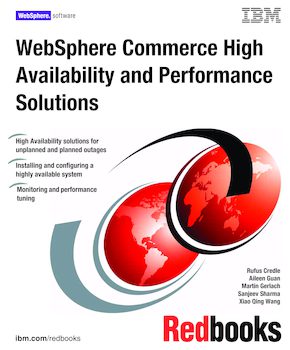WebSphere Commerce High Availability and Performance Solutions
An IBM Redbooks publication
Note: This is publication is now archived. For reference only.

Published on 06 August 2008
ISBN-10: 0738431338
ISBN-13: 9780738431338
IBM Form #: SG24-7512-00
Authors: Rufus Credle, Aileen Guan, Martin Gerlach, Sanjeev Sharma and Xiao Qing Wang
Building a high performance and high availability Commerce site is not a trivial task, from having the correct capacity hardware to handle the workload to properly test the code change before deploying in production site. This IBM® Redbooks® publication covers several major areas that need to be considered when using WebSphere® Commerce and provide solutions for how to address them. Here are some of the topics discussed:
How to build a Commerce site to deal with various kinds of unplanned outage. This include utilizing IBM WebSphere Application Server Network Deployment 6.0 and IBM DB2® High Availability Disaster Recovery (HADR) in the Commerce environment.
How to build a Commerce site to deal with planned outages such as software fixes and operation updates. This includes use of the WebSphere Application Server Rollout Update feature and the use of Commerce Staging Server and Content Management.
How to proactively monitor the Commerce site and prevent potential problems from occurring. Various tools are discussed, such as WebSphere Application Server build-in tools and Tivoli®'s Performance Viewer.
How to utilize Dynacache to future enhance your Commerce site's performance. This includes additional Commerce command caching introduced in Commerce fix pack and e-spot caching.
The methodology of doing performance and scalability testing on a Commerce site.
Part 1. Getting started
Chapter 1. Introduction
Chapter 2. Project planning for High Availability and performance
Chapter 3. Scenario for this book
Part 2. High Availability solutions for unplanned and planned outages
Chapter 4. External clustering software
Chapter 5. Database tier High Availability
Chapter 6. WebSphere Application Server High Availability
Chapter 7. Web tier High Availability
Part 3. Installation and configuration of a High Availability WebSphere Commerce system
Chapter 8. Base product and fix pack installations for all tiers
Chapter 9. High Availability solution for IBM DB2 Universal Database
Chapter 10. WebSphere Application Server and WebSphere Commerce federation and clustering
Chapter 11. Web server clustering
Part 4. Design with performance in mind
Chapter 12. Development performance considerations
Chapter 13. Caching
Chapter 14. Profiling
Part 5. Monitoring and performance tuning
Chapter 15. Operating system monitoring tools
Chapter 16. IBM DB2 Universal Database
Chapter 17. Monitor and tune WebSphere Application Server for WebSphere Commerce
Chapter 18. Monitor and tune Web servers
Chapter 19. Monitor and tune Load Balancer
Part 6. Performance test
Chapter 20. Introduction to performance testing
Chapter 21. Designing a test plan
Chapter 22. Performance test tools
Chapter 23. Applying performance testing to WebSphere Commerce
Chapter 24. Analyzing test results and solving performance problems
Part 7. Maintenance
Chapter 25. Database maintenance
Chapter 26. Maintain and update WebSphere Application Server tier
Chapter 27. Maintain and update Web servers
Chapter 28. Maintain and update Load Balancer